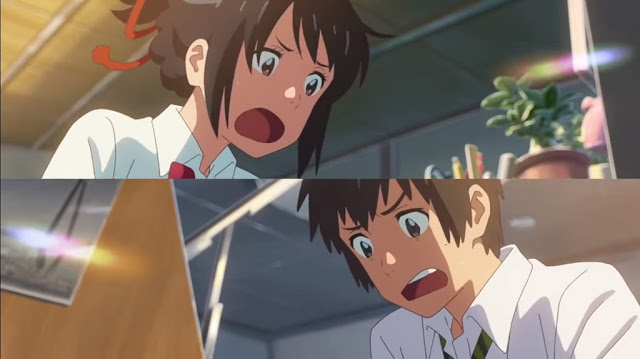Part playful comedy, part wistful romance, part sci-fi mind-bender, Your Name. (yes, the period is part of the title) is a strange and beguiling experience. It’s a movie that nimbly hopscotches between tones and across genres, but it always demonstrates firm commitment to its characters. Visually, it’s a beaut, but the loveliest thing about it is its tenderness.
The ultimate intensity of Your Name.’s emotions sneaks up on you, given that the film initially scans as a poppy Japanese update on America’s cheesy ’80s comedies. Taki (voice of Ryûnosuke Kamiki), a high school student living in the clattering hub of Tokyo, is a typical teenage protagonist—comfortable with his male pals, awkward around his female crushes, and nursing a nagging worry that his existence lacks real meaning. The same is true of Mitsuha (Mone Kamishiraishi), a dreamer living in the country village of Itomori; she has a relatively peaceful life going to school and making traditional sake, but she longs for the bustle of the big city. Residing in decidedly different worlds, Taki and Mitsuha have no connection to one another, except for one little thing: Intermittently and inexplicably, their minds get swapped into one another’s bodies.
That’s right, Your Name.—a movie that’s profoundly thoughtful, delicate, and empathetic—is a body-switch comedy. In the estimable tradition of Freaky Friday and Vice Versa, it watches in amusement as Mitsuha and Taki each struggle to navigate the other’s foreign circumstances. Adapting his novel, writer-director Makoto Shinkai generates ample laughs from the characters’ shared predicament, both physical (transplanted to Mitsuha’s body, Taki cannot prevent himself from fondling her breasts) and situational (Mitsuha’s feminine touch helps Taki impress a female colleague, to the shock and jealousy of his male coworkers). Some of the humor is a bit broad—the characters’ exaggerated expressions of embarrassment and audible gasps of shock may fit snugly within anime convention, but they nevertheless feel cartoonish—but it’s mostly warmhearted, and the tone is generous rather than mocking.
Aided by some rollicking songs by the band Radwimps (for those seeing the subtitled version, it can be difficult to process the rapid-fire lyrics while simultaneously appreciating the gorgeous images), the first half of Your Name is funny and spirited, but as it proceeds, its atmosphere of boisterous comedy is gradually pierced by a ray of curious humanity. As Mitsuha and Taki gain greater understanding of their situation, they develop a system of communication, leaving messages in their smartphones that shift from indignant (“You have to be careful with skirts!” Mitsuha chastises Taki after learning that he had neglected to cross her legs while in her body) to encouraging. Somehow, despite never having actually met, they might be becoming friends. They might be becoming more.
Then, around the film’s halfway point, Shinkai delivers a devastating reveal, and Your Name. becomes a different movie entirely. I can scarcely disclose how, but I will say that, upon walking into an animated body-switch picture, I hardy expected to be reminded forcefully of 12 Monkeys. Such a gearshift might have induced whiplash, but Shinkai handles this tonal transformation adroitly, in part because the winsome melancholy that grows to dominate the film has been quietly present all along.
As an anime, Your Name. is a striking piece of work, with a painterly aesthetic that’s at once naturalistic and fanciful. The style is wonderfully detailed but nevertheless exhibits a watercolor-like abstraction, so that the more arresting images—such as a fiery comet streaking against the pale night sky—really pop. But the movie’s look is subservient to its narrative, which blossoms into a complex, emotionally rich story of love, loss, and yearning. In some ways, Your Name. is a straightforward boy-doesn’t-meet-girl tale; in others, it’s an earnest meditation on human connection, not to mention heady concepts like free will, predestination, and spiritualism.
With its final act, Your Name. crescendos to a climax that is undeniably poignant, yet isn’t quite as perfect as it strains to be. This is perhaps a self-fulfilling prophecy: Having previously accumulated such startling force, the film challenges itself to release its power with exactitude, to deliver a conclusion that is both thematically consistent and fundamentally satisfying. But if the ending isn’t entirely flawless, that’s less a failure of execution than a consequence of ambition, an understandable struggle to keep control of the storm of feelings that the movie has capably—and often exquisitely—stirred up.
Besides, Your Name.’s denouement pays tribute to its essential symmetry. As a romance, the film is thorny and atypical, but it recognizes that its two main characters, despite living miles apart, are sharing the same central story. They need one another, which is why we need them both. During one wrenching stretch, Mitsuha and Taki mysteriously find their connection fading, and they briefly fail to remember one another. It’s an ironic development for this beautiful movie, one that, with precision and compassion, so gently strikes the mystic chords of memory.
Jeremy Beck is the editor-in-chief of MovieManifesto. He watches more movies and television than he probably should.



